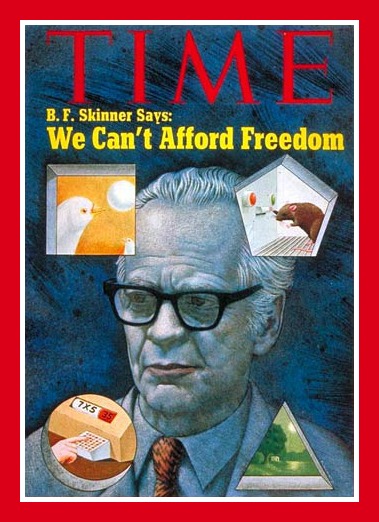B.F. Skinner
(Mar 20, 1904 - Aug 18, 1990)
One of the most eminent figures in the history of psychology, Burrhus Frederic (B.F) Skinner's advocacy of radical behaviorism and the experimental analysis of behavior were profoundly influential. Within his groundbreaking body of work, 'Behavior of Organisms' (1938) and 'Verbal Behavior' (1957) are widely considered major contributions to human thought.
Among the numerous awards and honors conveyed on him throughout a remarkable career, B.F Skinner was the recipient of the Humanist of the year award in 1972 and received the American Psychological Association's Award for Outstanding Lifetime Contribution to Psychology in 1990.
Biographical Landmarks
September 2, 1938
B. F. Skinner's first book 'The Behavior of Organisms' was published. Based on nearly a decade of research including the work conducted during his time as a graduate student at Harvard, this groundbreaking text introduced the key tenets of Behavior Analysis; particularly the profoundly influential causal relationship between actions and their immediate consequences; a unit of behavior Skinner termed 'operant.'
February 6, 1951
B. F. Skinner self-published his classic book 'Science and Human Behavior.' Originally printed as a teaching resource for his Natural Sciences course at Harvard; this groundbreaking text includes one of Skinner's earliest accounts of the similarity between operant selection and Darwinian natural selection in phylogeny. The Macmillan Company published the first formal edition of Science and Human Behavior in 1953.
January 17, 1969
At a ceremony at the White House, President Lyndon B. Johnson presented B. F. Skinner with The National Medal of Science, "For basic and imaginative contributions to the study of behavior which have had profound influence upon all psychology and many related areas." The National Medal of Science is the United States Government's highest award for distinguished achievement in science.
September 20, 1971
B. F. Skinner is featured on the front cover of Time magazine and is the subject of three cover stories on behavior, titled 'Skinner's Utopia: Panacea, or Path to Hell?' 'Twin Oaks: On to Walden Two' and 'A Skinnerian Innovation: Baby in a Box.' The brilliant cover image of Skinner was drawn by renowned artist and illustrator Don Ivan Punchatz.
Setting The Record Straight
One of the most enduring rumors surrounding the work and life of B.F. Skinner was that he raised his daughter Deborah in an experimental box so that all her needs could be controlled and shaped; experiences that were said to have resulted in her having a psychotic breakdown and committing suicide. In order to set the record straight, not least to show that reports of her death had been greatly exaggerated! Deborah Skinner wrote an article for the Guardian newspaper in 2004 which you can read in full HERE.
What Was B. F. Skinner Really Like?
This question is addressed in detail by Michael Britt in an episode of his brilliant psychology podcast, The Psych Files. The episode is described as follows:
Would you be surprised to learn that B.F. Skinner was a very likable guy and that you may actually be very much in agreement with his ideas? Many people who study psychology have a negative impression of Skinner. Well, I’m about to challenge those impressions by presenting a side of Skinner you probably haven’t been exposed to. In these sound bytes you’ll hear his ideas about learning to play music, about discovery, having fun and becoming the most that you can be.
You can listen to this excellent podcast on B.F. Skinner by clicking HERE.
Legacy
CLICK HERE to listen to a fascinating BBC Radio 4 broadcast featuring Claudia Hammond who explores the legacy of BF Skinner and Behaviorism as part of her history of psychology series 'Mind Changers.'
This learning theory classic demonstrates how accidental connections between a ritual and favorable consequences can establish and maintain superstitious behavior. You can read this B.F. Skinner article in full for free via the following link.
Great video by Trystan Young featuring Skinner's concept of the reward schedule.
This Psychology Symbol - Vintage Retro Striped Sunset T-Shirt is available from Amazon (prime eligible) in a range of colors for women and men. Sales help support this website, which has been providing free and comprehensive information and resources for psychology students and educators since 2008.
Recent Articles
-
Dr. Jody Carrington Interview | Trauma, Connection, and Mental Health
Feb 04, 26 08:18 AM
Interview with Dr. Jody Carrington on trauma integration, loneliness, burnout, and what it really means to feel seen. -
Psychology Articles by David Webb
Jan 26, 26 04:52 AM
Discover psychology articles by David Webb, featuring science-based insights into why we think, feel, and behave the way we do. -
Why Doing Nothing Feels So Hard | Psychology of the Restless Mind
Jan 26, 26 04:42 AM
Why does doing nothing feel uncomfortable? Psychology research reveals how attention, the default mode network, and unstructured thought shape inner restlessness.
Please help support this website by visiting the All About Psychology Amazon Store to check out an awesome collection of psychology books, gifts and T-shirts.
Go To The Psychology Pioneers Page










